The OSR - Old School Renaissance
Welcome to the world of the Old School Renaissance (OSR), a vibrant movement that revives the classic role-playing styles of the 1970s and 1980s. This page delves into the origins, core principles, and community dynamics of OSR, highlighting its timeless appeal and ongoing evolution. Whether you're a veteran player or new to the scene, discover how OSR embraces creativity, player-driven stories, and the thrill of the unknown.
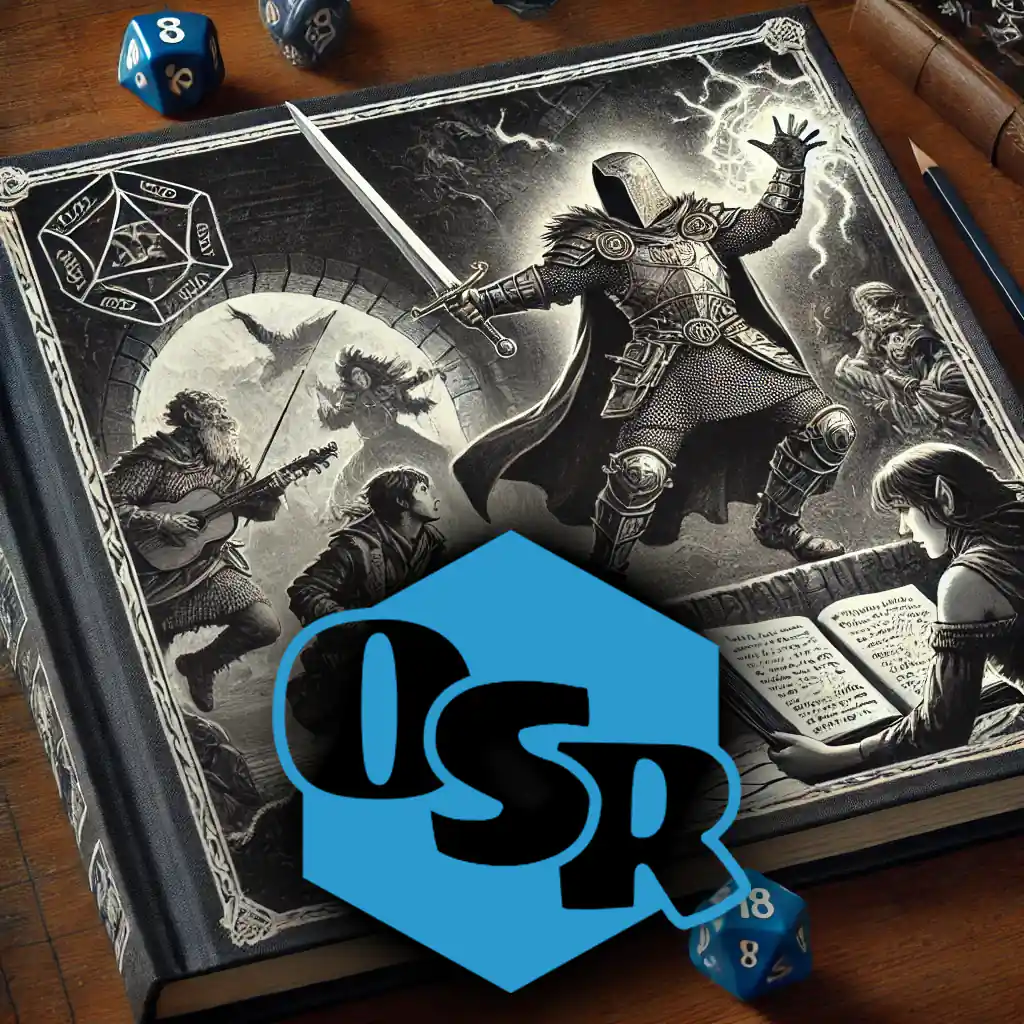
Introduction to OSR (Old School Renaissance)
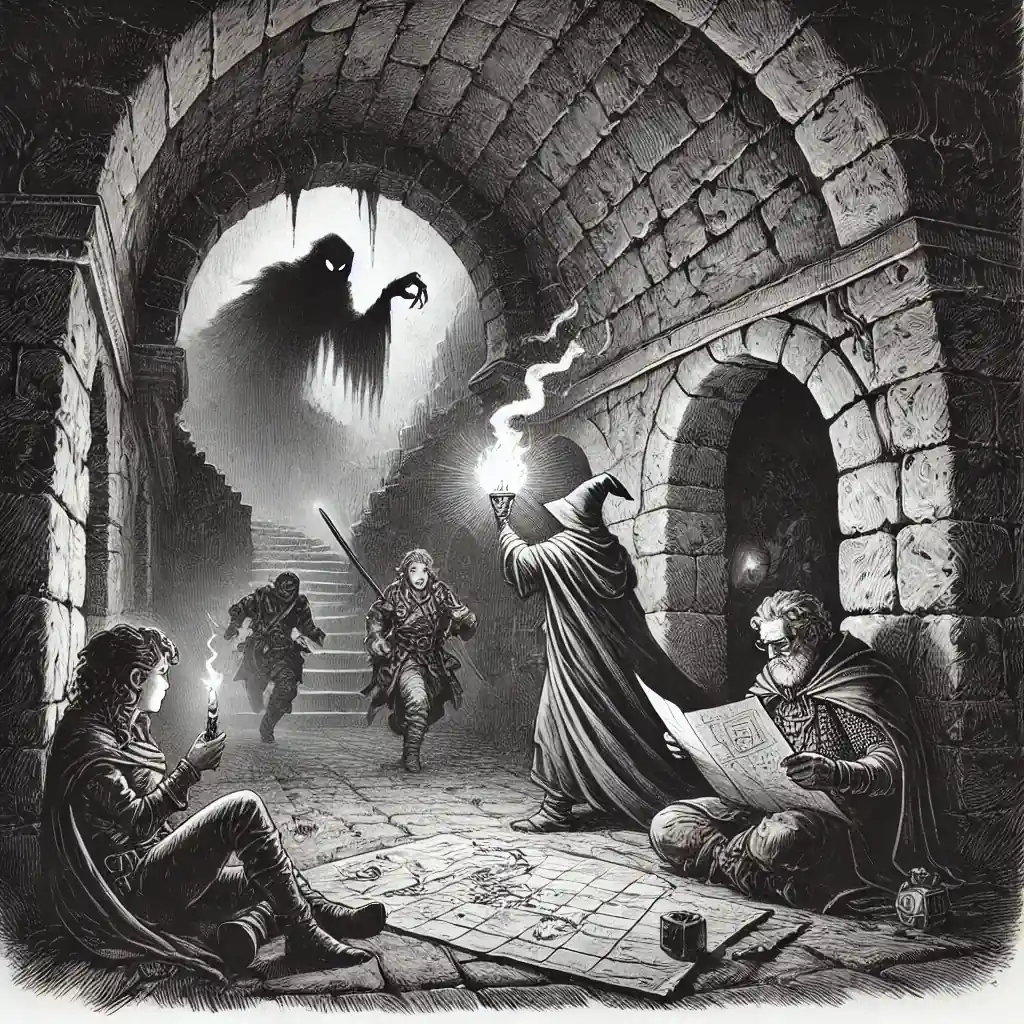
The Old School Renaissance, or OSR, is a revival movement within tabletop role-playing games that champions the classic styles of the 1970s and 1980s. Born from a desire to recapture the magic of early RPGs, OSR emphasizes simpler mechanics, creative problem-solving, and putting the power back into the hands of the players and game masters. Imagine an adventure where every decision is a gamble, every dungeon is a deadly puzzle, and the referee's word is law. This is OSR—a world where the story unfolds as much by dice as by daring.
Imagine stepping into an adventure where every room is a riddle and every monster encounter is a deadly dance of wit and strategy. Picture your party sneaking through a crumbling fortress, with nothing but a faded map and a torch that flickers ominously. Each choice carries the weight of unknown consequences, and the game master's voice narrates the scene with a sense of urgency that keeps everyone on edge. In the OSR, every player is a co-author of the unfolding story.
What OSR Stands For
OSR stands for "Old School Renaissance" or "Old School Revival," reflecting a collective return to the foundational elements of role-playing games. It's about embracing the DIY spirit: building worlds with just a few notes, running games that feel like conversations, and facing challenges that no character sheet alone can solve. Whether in a dim tavern corner or at the grand gates of a forgotten city, OSR games put the story back in the players' hands, where improvisation meets nostalgia and every roll could be the last.
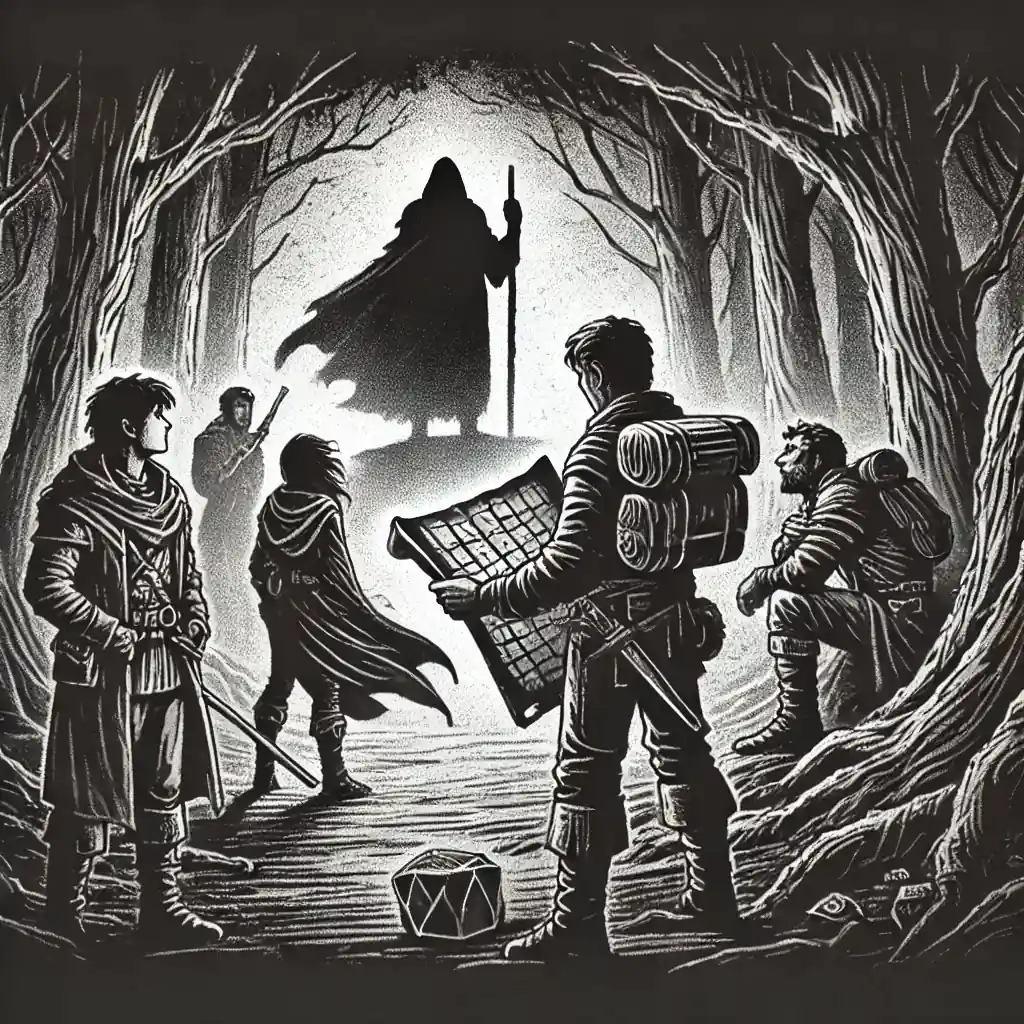
"Picture this: Your party of adventurers stands on the edge of a dark forest. The map is old and faded, the rumors are wild, and the only way forward is into the unknown. No handbook can tell you what comes next—only your wits, your courage, and the roll of the dice. This is the OSR way. I've run games where a single decision—turning left instead of right—changed the fate of heroes forever. That's what OSR is about: the thrill of discovery, the weight of every choice, and the joy of creating stories that no one else has told."
The Significance of OSR in the RPG World
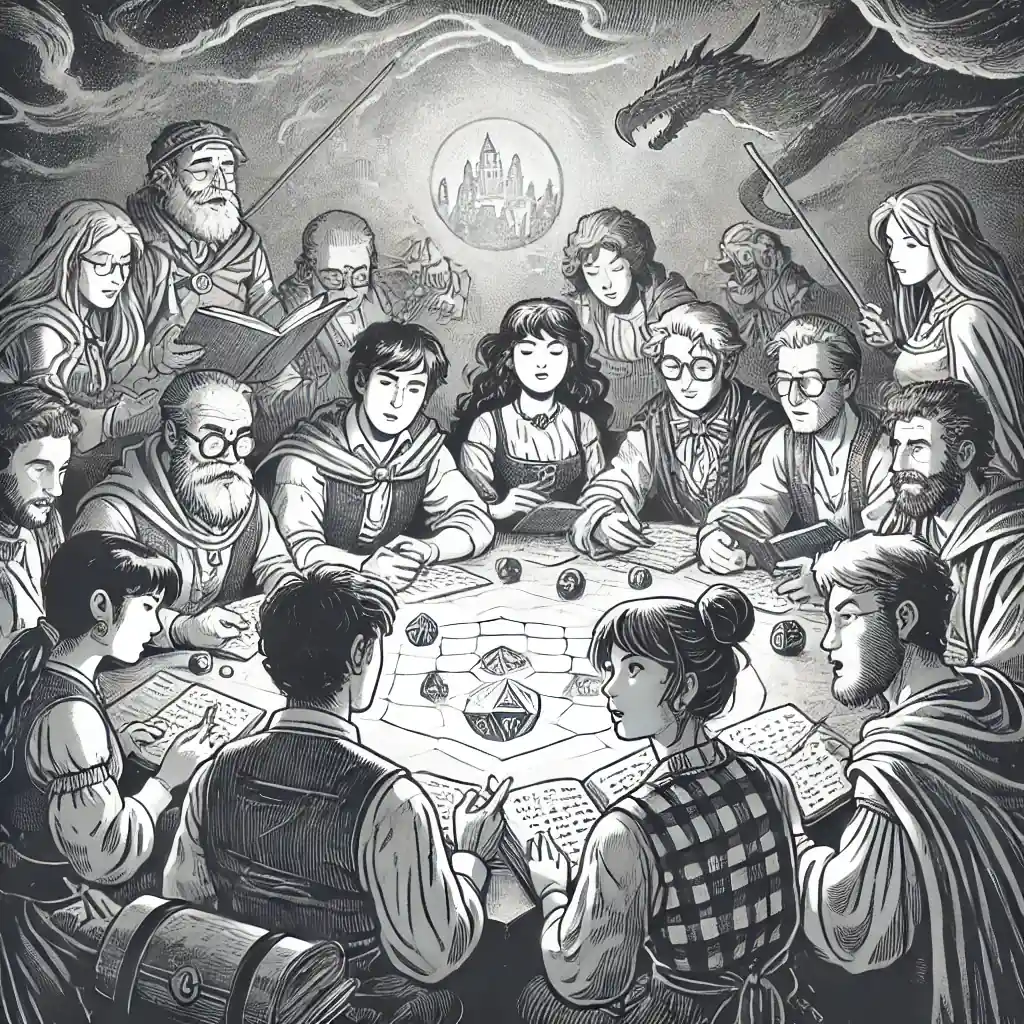
OSR is more than just a play style; it's a philosophy that values player agency, creativity, and the unpredictability of shared storytelling. It has reignited a passion for role-playing that relies less on intricate rules and more on the imagination of the group around the table. As OSR continues to grow, it serves as a bridge between the past and the future of gaming, inviting players to step back into a world where the only limit is the size of your next adventure.
The Old School Renaissance (OSR) traces its roots back to the earliest days of tabletop role-playing games, particularly the first editions of Dungeons & Dragons. Born in the 1970s, these early games prioritized creativity, exploration, and high-stakes decision-making over complex rules. Legendary figures like Gary Gygax and Dave Arneson laid the foundation for this style, emphasizing player skill, minimalistic mechanics, and the referee's role as an impartial judge. The nostalgia for these experiences sparked a resurgence, bringing about a revival of classic gaming principles.
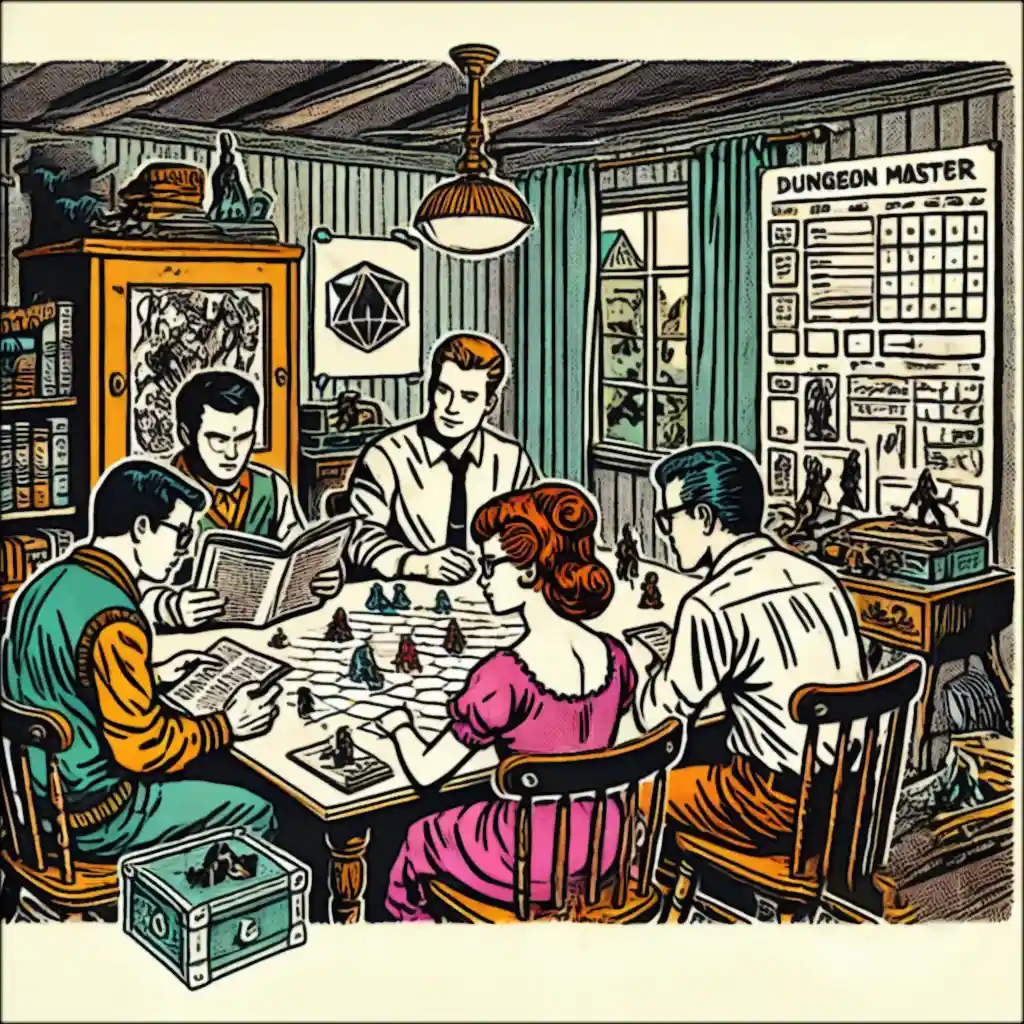
The OSR movement officially took shape in the early 2000s when players sought to recreate the feel of original D&D games. One pivotal moment was the release of OSRIC (Old School Reference and Index Compilation) in 2006, a comprehensive ruleset that allowed creators to legally publish content in the style of AD&D. Games like Swords & Wizardry, Labyrinth Lord, and Basic Fantasy RPG soon followed, each contributing unique spins on old-school mechanics. The development of open licenses enabled a flood of community-driven projects, cementing OSR's place in the RPG world.
The OSR community grew from humble beginnings on niche forums like Dragonsfoot and Knights & Knaves Alehouse. What started as a few passionate discussions quickly evolved into a thriving network of creators and players sharing homebrew content, adventures, and design philosophies. The rise of social media, blogs like Grognardia, and conventions such as Gary Con further fueled OSR's growth. Today, OSR isn't just about revisiting the past; it's a living, breathing movement that continues to innovate while honoring the legacy of early tabletop RPGs.
"Back in the day, running a game meant grabbing a handful of dice, a pencil, and a hastily drawn map. The rules were simple—because if you didn't know them, you just made it up. I've seen players battle dragons with nothing but their wits and a lucky roll, and I've watched whole adventures unfold from a single cryptic rumor whispered in a tavern. That's the essence of OSR: it's not about perfect balance or elaborate mechanics. It's about the journey, the risks, and the stories you create along the way."
OSR stands as a testament to the enduring appeal of role-playing's roots. Through its milestones, community evolution, and dedication to keeping the game in the players' hands, OSR remains a vibrant part of the RPG landscape—where the past is not just remembered but celebrated and reinvented for a new generation of adventurers.
Core Principles of OSR
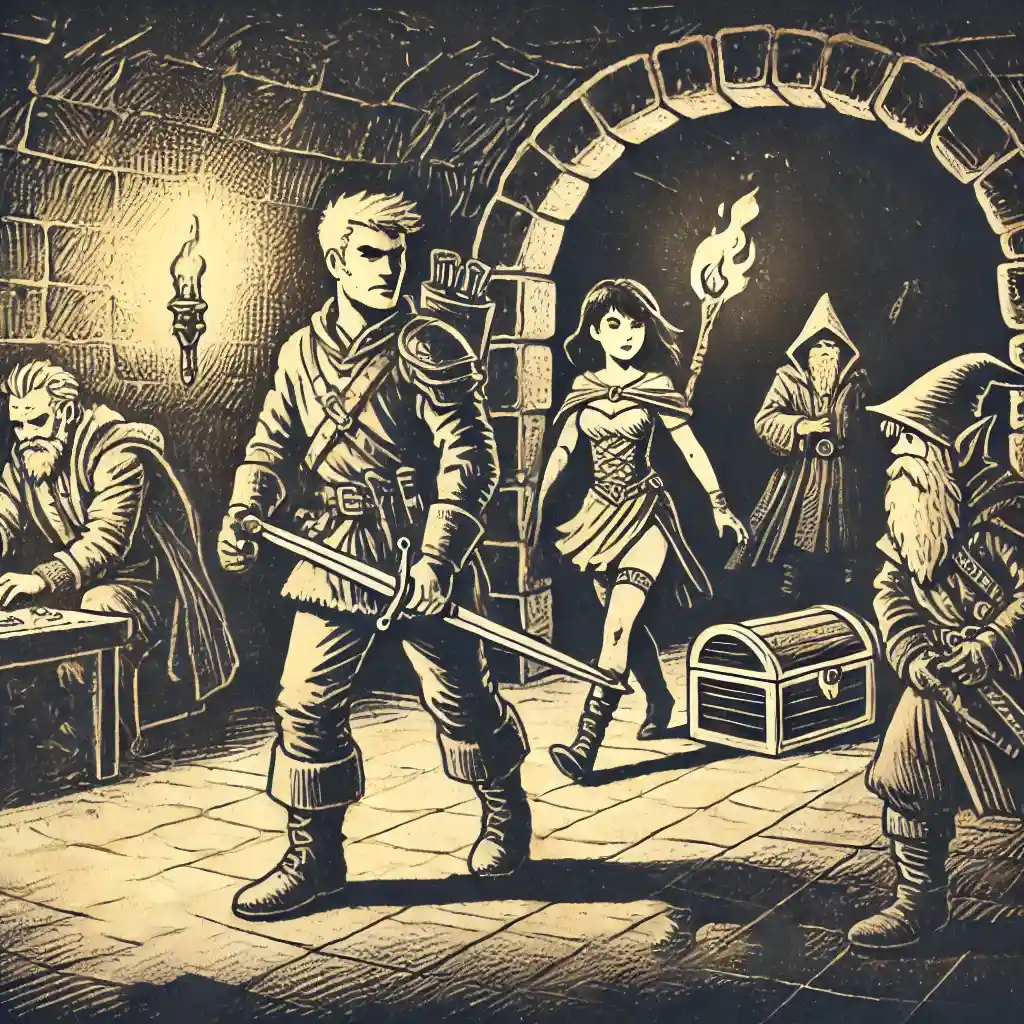
The Old School Renaissance (OSR) is a movement that celebrates the classic tabletop role-playing games of the 1970s and 1980s. It emphasizes sandbox play, player-driven narratives, high stakes, and simplicity of rules. In OSR games, the world is an open sandbox—players can explore dungeons, face dangers, and carve their own path without a predetermined storyline guiding them. There's a thrill in not knowing what lies ahead; every choice has consequences, and survival isn't guaranteed. Here, players drive the narrative, and the game master (GM) is less a storyteller and more a facilitator of the unknown.
At the heart of OSR (Old School Renaissance) is a gameplay philosophy that emphasizes sandbox play, player-driven narratives, high stakes, and simplicity of rules. In OSR games, the world is an open sandbox—players can explore dungeons, face dangers, and carve their own path without a predetermined storyline guiding them. There's a thrill in not knowing what lies ahead; every choice has consequences, and survival isn't guaranteed. Here, players drive the narrative, and the game master (GM) is less a storyteller and more a facilitator of the unknown.
"I remember the time my players ventured into the Tomb of the Serpent Kings. No hand-holding, no map markers—just a rough sketch and their wits. When they triggered that first trap, it wasn't the dice that saved them; it was their decision to backtrack and approach with caution. OSR isn't about hitting checkpoints; it's about the tension, the risk, and the reward that comes from truly owning your journey."
Rules Light and DIY Ethos OSR embraces a rules-light approach that keeps the focus on imagination rather than mechanics. The DIY (Do-It-Yourself) ethos is central to this, encouraging game masters and players to tweak, hack, and homebrew their games to fit their unique style. Instead of thick rulebooks, OSR uses minimal guidelines that can be easily bent or ignored, fostering creativity and fluid gameplay.
Voice of a Veteran GM: "You don't need fancy rulebooks to have a great game. One of my best sessions was run on nothing but a few index cards, a handful of dice, and a borrowed monster manual. Players came up with wild, unexpected solutions—like bribing a dragon with a cursed artifact—that no official rule could cover. That's the beauty of OSR: it's not about following the book; it's about writing your own."
Nostalgia vs. Innovation OSR thrives on a delicate balance between nostalgia and innovation. It honors the classic mechanics of early RPGs—deadly dungeons, player agency, and unpredictable magic—while welcoming new interpretations that keep the scene fresh. Modern OSR games like The Black Hack or Lamentations of the Flame Princess bring unique twists that challenge conventions while staying true to the old-school spirit.
"The first time I ran a hybrid game using Swords & Wizardry rules with elements from newer indie RPGs, my players were hooked. We had the classic dungeon crawl feel, but with enough fresh mechanics to keep everyone on their toes. OSR isn't about living in the past; it's about keeping the core alive while letting it evolve with us."
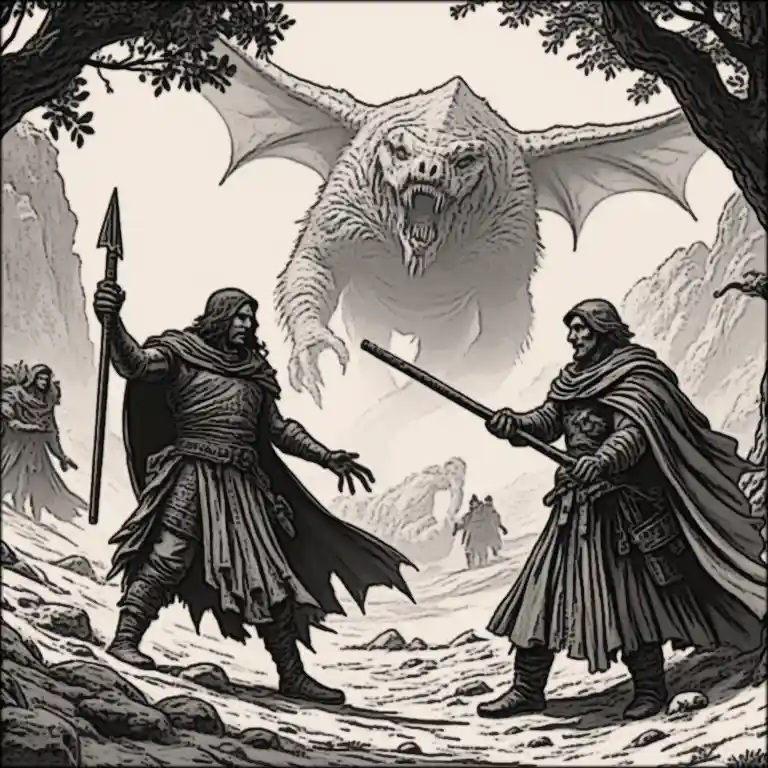
The core principles of OSR—sandbox gameplay, rules-light design, and a DIY ethos—create a rich tapestry of experiences that celebrate the roots of role-playing while embracing the innovations of today. It's a movement where every dungeon is yours to explore, every rule is yours to bend, and every story is yours to tell. In the world of OSR, the dice might be fickle, but the thrill of adventure is a guarantee.
Popular OSR Games and Supplements
The OSR scene is rich with games and supplements that honor the past while pushing the boundaries of what's possible. Here are some of the most notable titles that have shaped the movement and continue to inspire players and game masters today.
OSRIC (Old School Reference and Index Compilation): OSRIC stands as one of the first and most influential OSR games, faithfully recreating the feel of AD&D 1st edition. It offers a comprehensive toolkit that's perfect for those who want to dive back into the classic mechanics of the 70s and 80s. As Stuart Marshall, co-creator of OSRIC, once said, “We wanted to capture the magic of those early days, where every roll felt like it could change the world.”
Old School Essentials (OSE): OSE is celebrated for its clarity and ease of use, presenting the rules of Basic/Expert D&D in a beautifully organized, modern format. It's perfect for both newcomers and seasoned players who appreciate the nostalgic feel with streamlined accessibility. The game's modular approach means you can mix and match rules to fit your group's playstyle, making it one of the most adaptable OSR titles available.
Swords & Wizardry: Created by Matthew Finch, Swords & Wizardry captures the spirit of original D&D while offering a simplified, easy-to-run system. Finch describes it as “a love letter to the first days of role-playing, where imagination trumped mechanics.” The game encourages creativity, with rules that serve as guidelines rather than rigid structures, making every session unique.
Lamentations of the Flame Princess (LotFP): Known for its dark, horror-inspired themes, LotFP takes OSR into uncharted, often disturbing territories. It blends traditional mechanics with bizarre and often unsettling adventures, offering an experience that's as much about atmosphere as it is about gameplay. Creator James Raggi IV pushes boundaries with modules that defy expectations, ensuring no two LotFP games are ever the same.
A Game Master's Anecdote: “I'll never forget running ‘The God that Crawls' for my group. No one knew what to expect, and when they encountered that relentless monstrosity in the dark tunnels, the tension was palpable. There were no balanced encounters, no safety nets—just raw, unpredictable terror. That's the heart of OSR.”
Resources and Tools OSR isn't just about rulebooks; it's a movement fueled by community-driven resources. Key supplements and zines like Knock!, The Hyqueous Vaults, and Hexagram provide endless inspiration with new monsters, settings, and adventures. Online platforms like DriveThruRPG offer a wealth of OSR modules, tools, and fan-made content, making it easy to expand your game.
Essential Zines: Knock! is a standout, filled with imaginative ideas, old-school artwork, and creative rule twists that keep OSR gaming fresh. The DIY spirit is alive and well in these pages, proving that OSR is as much about community as it is about gameplay.
"OSR zines are like treasure chests—you never know what kind of magic you'll find inside. One week, it's a haunted lighthouse adventure; the next, a bizarre cult ritual that your players stumble into. These aren't just supplements; they're invitations to create something unforgettable."
The world of OSR is vast and varied, with games and supplements that honor the past while boldly pushing into new realms. Whether you're delving into the depths of OSRIC, exploring the clean design of Old School Essentials, or navigating the strange horrors of Lamentations of the Flame Princess, OSR offers a uniquely personal journey. It's a movement that celebrates the best of old-school RPGs while continuously evolving, thanks to the boundless creativity of its community.
Why OSR Matters Today
OSR (Old School Renaissance) gaming offers a refreshing departure from the complex, rule-heavy systems dominating modern tabletop RPGs. For many players, OSR provides a return to the roots of role-playing, where creativity and player decisions shape the narrative more than pre-written scripts or endless rulebooks. The simplicity of OSR's mechanics—focusing on rulings over rules—allows for quick play, fostering a sense of freedom and improvisation rarely seen in today's meticulously balanced systems.
OSR (Old School Renaissance) games offer a refreshing departure from the complex, rule-heavy systems dominating modern tabletop RPGs. For many players, OSR provides a return to the roots of role-playing, where creativity and player decisions shape the narrative more than pre-written scripts or endless rulebooks. The simplicity of OSR's mechanics—focusing on rulings over rules—allows for quick play, fostering a sense of freedom and improvisation rarely seen in today's meticulously balanced systems.
A Player's Perspective:"I'll never forget the first time I ran an OSR game after years of modern RPGs. My players were shocked when they realized there were no safety nets—no plot armor, no carefully curated encounters. Just raw adventure. When one of them outsmarted a powerful foe by using a rusty trapdoor and some clever thinking, they were hooked. It wasn't about leveling up; it was about surviving the night."
One of the most remarkable aspects of the OSR movement is its vibrant, community-driven nature. Fans are not just players; they are creators, constantly contributing new modules, art, and rule tweaks that keep the OSR scene alive and evolving. Zines like Knock! and community forums such as Dragonsfoot and Knights & Knaves Alehouse are brimming with user-generated content, offering a never-ending supply of inspiration and resources.
In the Words of a Game Master: "The best part of running OSR games is the wealth of community content. I've picked up zines with whole campaigns written by fellow fans, complete with maps and encounters I never would have thought of. And when I wanted to tweak a rule, I found half a dozen homebrew options online, each one tailored by players who'd tested them in the heat of play. OSR isn't just about playing old games—it's about keeping those games alive with fresh ideas and perspectives."
OSR games continue to thrive because they offer something rare in today's RPG landscape: simplicity, creativity, and community. They are a testament to the enduring appeal of role-playing's roots, where the dice roll boldly, the rules bend to the story, and the best adventures are born not from a book, but from the imaginations of those gathered around the table. OSR matters today because it's not just a revival—it's a renaissance that invites everyone to take part.
Getting Started with OSR
Getting started with OSR (Old School Renaissance) gaming is easier than it might seem. The first step is choosing the right system. For beginners, games like Old School Essentials and Basic Fantasy RPG are great entry points due to their clear rules and accessible presentation. Look for local gaming groups or online communities on platforms like Reddit's r/osr or forums such as Dragonsfoot, where you can find games or ask for advice. Many OSR games are designed to be easy to pick up, with minimal prep needed.
Beginner-Friendly Advice:A Seasoned GM's Insight: “When you're new to OSR, don't get bogged down by rules or feel pressured to know everything. Start small. I began my nephew on a simple dungeon crawl with Swords & Wizardry. We had only three dice and a one-page character sheet. It wasn't about doing it ‘right'; it was about having fun, learning together, and making the game our own.”
Several beginner-friendly games and resources can help new players and referees get into OSR. Basic Fantasy RPG is available as a free download and serves as a perfect introduction, blending old-school mechanics with a clear layout. Swords & Wizardry offers a streamlined version of original D&D, making it simple yet true to the classic feel. Old School Essentials provides a beautifully organized, modular approach that keeps the rules concise and clear, perfect for new players.
Essential Resources: Zines like Knock! and free resources on DriveThruRPG offer endless adventure hooks, random tables, and rule tweaks that add depth to your sessions without overwhelming complexity. Open-license supplements often encourage you to adapt and change elements, which is at the core of the OSR spirit.
“I've run games with nothing more than a zine and a handful of dice, and those sessions turned into some of the most memorable nights around the table. OSR is less about mastering the rules and more about mastering the art of play. There's no right way, only your way.”
Embarking on your OSR journey means embracing a world of endless possibilities where the rules are light, the stakes are high, and every decision shapes the story. With the wealth of beginner-friendly games and community resources available, getting started has never been easier. Dive in, roll the dice, and discover why OSR continues to captivate players old and new.
Connecting with the OSR Community
The OSR community is a vibrant and passionate group of players and creators who share a love for the classic tabletop role-playing games of the 1970s and 1980s. This community thrives in online spaces, conventions, and forums, where enthusiasts gather to discuss, share, and celebrate the old-school gaming experience.
The OSR community thrives in dedicated online spaces where enthusiasts share ideas, adventures, and advice. Dragonsfoot and Knights & Knaves Alehouse are two of the oldest and most respected forums, filled with discussions on classic rules, homebrew content, and the philosophy of old-school gaming. Reddit's r/osr offers a more casual space for newcomers and veterans alike to exchange tips, post game recaps, and explore new OSR releases. Discord channels also provide real-time interaction, often hosting games, workshops, and vibrant community chats.
A GM's Perspective: “I stumbled upon Dragonsfoot years ago, looking for an obscure rule clarification. I stayed for the camaraderie. It's not just a forum; it's a library of experiences, where game masters swap stories of impossible escapes, dangerous dungeons, and unforgettable player moments. If you're new to OSR, these spaces are where you'll find your tribe.”
Conventions and Events OSR isn't just an online phenomenon; it's celebrated at conventions like Gary Con and North Texas RPG Con, where the spirit of old-school gaming is alive and well. These events feature panels with legendary creators, workshops on game mastering, and open tables where you can play classic adventures or even run your own. Participating in these cons offers a chance to connect with fellow enthusiasts, learn from seasoned game masters, and experience the best of OSR in a communal setting.
A Convention Story: “Last year at Gary Con, I ran a classic Keep on the Borderlands session. The players—a mix of seasoned adventurers and complete newcomers—transformed a simple exploration into an epic tale of bravery, betrayal, and sheer luck. It wasn't just a game; it was a reminder of why we do this. Conventions are where OSR truly comes to life.”
Connecting with the OSR community means more than just finding a game; it's about joining a living tradition of creativity and shared storytelling. Whether you're lurking on a forum, chatting in a Discord server, or rolling dice at a convention, these spaces keep the heart of OSR beating. Dive in, introduce yourself, and become part of the ongoing adventure that is the Old School Renaissance.
Controversies and Challenges in the OSR Scene
The OSR scene is a vibrant and passionate community of players and creators who share a love for the classic tabletop role-playing games of the 1970s and 1980s. However, like any community, it has its share of controversies and challenges.
The OSR community, while vibrant and passionate, is not without its share of controversies. Discussions often arise around issues of inclusivity, traditionalism, and gatekeeping. Some argue that OSR should strictly adhere to the ethos of early tabletop RPGs, preserving the “old-school” feel without modern influence, while others push for inclusivity and broader representation within the space. This clash of perspectives can create friction, with some members feeling excluded or unwelcome.
A Veteran GM Reflects: “I've been in this community for years, and I've seen heated debates over what ‘real' OSR is. Some want it pure—just like it was back in the day. Others believe OSR should evolve, welcoming new voices and ideas. It's a balancing act, and every table handles it differently.”
OSR means different things to different people, and that diversity is both a strength and a challenge. For some, OSR is about strict adherence to the rules and styles of 1970s and 1980s games, while others view it as an open canvas where old mechanics are reimagined in innovative ways. This evolving definition makes OSR unique, but it also leads to disagreements on what the movement should represent.
In the Words of a Game Master: “To me, OSR isn't just a set of rules; it's a mindset. I've seen tables that run gritty, no-nonsense dungeon crawls next to games that blend OSR mechanics with narrative-driven play. The beauty is, OSR is what you make of it—whether it's a love letter to the past or a bold new take.”
The OSR community continues to navigate these dynamics with passion and dedication. While differing opinions can spark debate, they also keep the movement vibrant and diverse, allowing it to evolve while respecting its roots. OSR's challenges are part of what makes it compelling: a constantly shifting landscape where everyone is invited to take part, bring their own vision, and roll the dice on what comes next.
Creatures & Chronicles in the OSR Landscape
Creatures & Chronicles is a browser-based computer game that draws deeply from the core principles of the OSR movement. It emphasizes player agency, meaningful choices, and the unfolding of personal stories over traditional mechanics like leveling up. While it's a browser-based computer game, it captures the spirit of tabletop OSR by allowing players to shape their journey through decisions that truly matter. In the words of the developer, "This game isn't about becoming a superhero—it's about surviving, discovering who your characters are, and seeing how their stories evolve through the challenges they face."
"Creatures & Chronicles" draws deeply from the core principles of the OSR movement, emphasizing player agency, meaningful choices, and the unfolding of personal stories over traditional mechanics like leveling up. While it's a browser-based computer game, it captures the spirit of tabletop OSR by allowing players to shape their journey through decisions that truly matter. In the words of the developer, "This game isn't about becoming a superhero—it's about surviving, discovering who your characters are, and seeing how their stories evolve through the challenges they face."
The game aligns with the OSR community's values by focusing on experiences that feel raw and personal. Just like a classic dungeon crawl, "Creatures & Chronicles" offers a world where the stakes are real, and every action could lead to triumph or downfall, making each session unique and memorable.
Creatures & Chronicles embraces the OSR ethos of creativity, openness, and player empowerment, even without a traditional game master. The game encourages players to get to know their characters—not just their skills but their personalities, fears, and motivations. The developer describes this approach as "a way to bring the OSR spirit into a digital format, where you're not just playing a game but living a story. We wanted to create a space where players feel they are discovering something new every time they log in, guided not by scripted paths but by their own choices."
In "Creatures & Chronicles," the world reacts to the player, much like a GM responding to the party's actions. There are no set answers or predetermined paths—just the consequences of every decision, in true OSR fashion. This approach allows the game to capture that same feeling of unpredictability and personal engagement that defines the best of OSR, making it a fitting entry in the landscape of old-school-inspired adventures.
Creatures & Chronicles finds its place within the OSR landscape by focusing on the journey rather than the destination. It's not just a game; it's an evolving narrative shaped by the player's decisions, reflecting the core values of the OSR movement: creativity, player-driven stories, and the thrill of the unknown.
Call to Action: Join the Adventure
OSR is not just about playing; it's about participating. It's an open invitation to be part of a legacy where every roll of the dice tells a story, and every player leaves their mark. So gather your courage, grab your dice, and join the adventure. The next great story is waiting for you to create it.
The world of OSR is more than just games—it's a vibrant community of storytellers, adventurers, and creators. Whether you're a seasoned player or new to the scene, there's a place for you at the table. Explore classic titles, share your stories, and immerse yourself in the rich tapestry of old-school role-playing. Dive into forums like Dragonsfoot, join the discussions on Reddit's r/osr, or step into the digital realm with "Creatures & Chronicles" where your decisions shape the journey.
A Veteran's Invitation: “The first time you see your choices come alive, when you outsmart a cunning trap or survive against all odds, that's when you truly understand OSR. We're not just playing games; we're living adventures. Come join us.”
OSR thrives on the creativity and passion of its community. Your feedback helps us keep the spirit alive, and your contributions—whether it's a new house rule, a thrilling adventure, or just your thoughts—make this journey richer for everyone. Share your insights, post your homebrews, and let's keep the conversation going.
In the Words of the Community: “Every voice adds to the story. Whether you're crafting a new dungeon, drawing a character sketch, or just cheering others on, your presence matters. Let's build this world together.”
OSR is not just about playing; it's about participating. It's an open invitation to be part of a legacy where every roll of the dice tells a story, and every player leaves their mark. So gather your courage, grab your dice, and join the adventure. The next great story is waiting for you to create it.